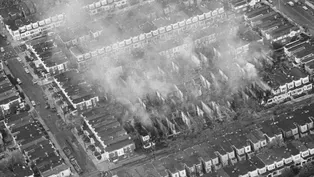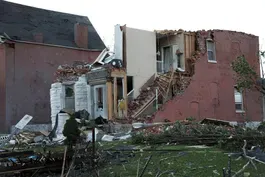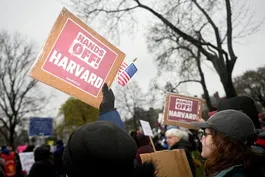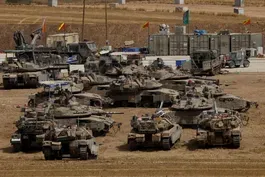
Tracing one Hmong family’s journey from Laos to Rhode Island
Clip: 5/17/2025 | 4m 33sVideo has Closed Captions
Tracing one Hmong family’s journey from Laos to Rhode Island
The Hmong are an ethnic group living primarily in China and Southeast Asia. There are communities of Hmong migrants across the globe. For Asian American and Pacific Islander Heritage Month, Isabella Jibilian of Rhode Island PBS Weekly spoke with a Hmong family about their history and their journey to America.
Problems playing video? | Closed Captioning Feedback
Problems playing video? | Closed Captioning Feedback
Major corporate funding for the PBS News Hour is provided by BDO, BNSF, Consumer Cellular, American Cruise Lines, and Raymond James. Funding for the PBS NewsHour Weekend is provided by...

Tracing one Hmong family’s journey from Laos to Rhode Island
Clip: 5/17/2025 | 4m 33sVideo has Closed Captions
The Hmong are an ethnic group living primarily in China and Southeast Asia. There are communities of Hmong migrants across the globe. For Asian American and Pacific Islander Heritage Month, Isabella Jibilian of Rhode Island PBS Weekly spoke with a Hmong family about their history and their journey to America.
Problems playing video? | Closed Captioning Feedback
How to Watch PBS News Hour
PBS News Hour is available to stream on pbs.org and the free PBS App, available on iPhone, Apple TV, Android TV, Android smartphones, Amazon Fire TV, Amazon Fire Tablet, Roku, Samsung Smart TV, and Vizio.
Providing Support for PBS.org
Learn Moreabout PBS online sponsorshipJOHN YANG: The Hmong are an ethnic group living primarily in China and Southeast Asia.
There are communities of Hmong migrants across the globe.
For Asian American and Pacific Islander Heritage Month, Isabella Jibilian of Rhode Island PBS Weekly recently spoke with a Hmong family about their history and their journey to America.
WOMAN: It's really good to make it soup.
JOHNNY KUE: Very few times my mom and dad have told me they love me, but I know based on how they show me and based how they feed me.
When they feed you, it's a sign of love.
My name is Johnny Kue, and this is my take on growing up Hmong.
The term Hmong means free man.
I would describe it as an ethnic group.
We don't have our own country.
We have our own language.
Hmong, I guess the best way I can say it is we're not a place.
We are a people.
A lot of Hmong history, you know, they were written in tapestry.
They were sewn in tapestry by our mothers and our grandmothers and our aunts.
To the outsider, looking in, it just looks like tapestry.
But when you really take the time to dissect it, you'll see there's a story being told.
In our culture, we call this the Bandao.
This one in particular explains my family's journey exactly.
My mother and father grew up in Laos, and it was around the time the Vietnam War happened that my father was recruited to join the Vietnam War.
MAN: Laos, the strategic key to Southeast Asia's richest areas.
JOHNNY KUE: The United States did not know how to navigate the jungles, and because the Hmongs were familiar with the jungles and the terrain, they were sort of like navigators in the jungle.
When my dad was first recruited into the secret army he was about 15 years old.
When the U.S. left the war, they had to fight for their lives.
They were enemies of Laos, and the orders were to kill the Hmong families on site or to put them in reeducation camps.
When my family were in the concentration camp and they were slated for either reeducation or they were slated to be executed, my sister, my oldest sister at the time, she was so skinny that she was able to get her hand untied from the ropes.
And after she got her hand free, she was able to untie my family.
They were able to escape those camps.
They decided to flee Laos.
The only way was to cross the river that was adjacent to Laos in Thailand.
There were soldiers that were guarding the rivers.
My sister at the time, she was probably one years old, she was on my mom's back and she slipped off.
My father just said that if we go back for her, that there's a chance that we all might be dead.
But my mother was able to rescue her and thankfully they were able to get across the river safely.
Eventually they did settle into Thailand, where they stayed for a while until the United States offered them political refuge.
My father was an immigration caseworker, and he would help get a lot of immigrants into Rhode Island.
A lot of the folks coming in did not have a voice, and there was a lot of fear for the refugees coming in for the first time.
My father did a lot of work with community leaders to help ease those fears and to help those early refugee settlers to become a part of the community.
We lived in South Providence, near the West End.
I have a really big family.
Seven siblings.
Four were born in Laosan-Thailand, and three of us were born in the United States.
I am the last of the seven.
I am the baby of the family.
So the Hmong community was always tight knit.
My father told me, if you're traveling somewhere and you're tired and it's late and you have nowhere to stay, find a phone book and you look up the last name Kue and you say, listen, I am so and so's son from Rhode Island.
Is it okay if we stay at your house tonight?
And he said that they would open up their home for you.
And that's just the community that I've been taught.
There was definitely a time in my life where I was trying to suppress, like who I was because I was trying to fit in.
But as I got older, I realized how important my culture was and I realized how important I need to pass this on to my son.
It became evident that, you know, everything done to raise me the right way is because of our Hmong values.
The largely forgotten history of Philadelphia’s MOVE bombing
Video has Closed Captions
Clip: 5/17/2025 | 6m 40s | The largely forgotten history of Philadelphia’s police bombing of Black organization MOVE (6m 40s)
News Wrap: Deadly storms rip through Kentucky and Missouri
Video has Closed Captions
Clip: 5/17/2025 | 3m | News Wrap: Deadly storms rip through Kentucky and Missouri (3m)
Trump’s escalating feud with Harvard affects cancer research
Video has Closed Captions
Clip: 5/17/2025 | 4m 39s | Trump administration’s escalating feud with Harvard affects breast cancer research (4m 39s)
Why Israel is mobilizing a new ground assault on Gaza
Video has Closed Captions
Clip: 5/17/2025 | 4m 42s | Israel mobilizes new ground assault on Gaza to pressure Hamas into freeing hostages (4m 42s)
Providing Support for PBS.org
Learn Moreabout PBS online sponsorshipSupport for PBS provided by:
Major corporate funding for the PBS News Hour is provided by BDO, BNSF, Consumer Cellular, American Cruise Lines, and Raymond James. Funding for the PBS NewsHour Weekend is provided by...















